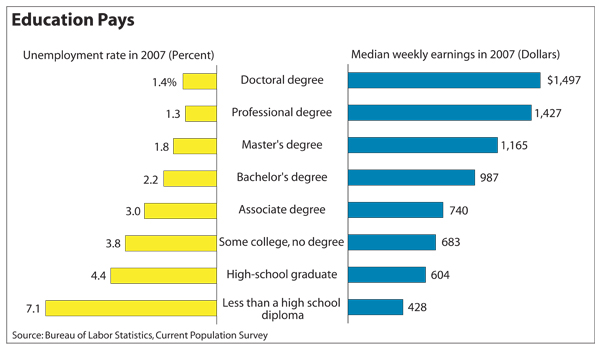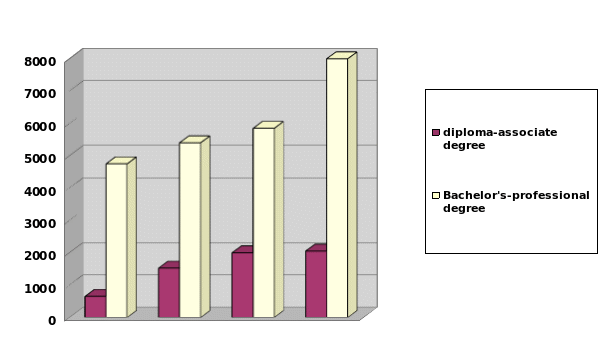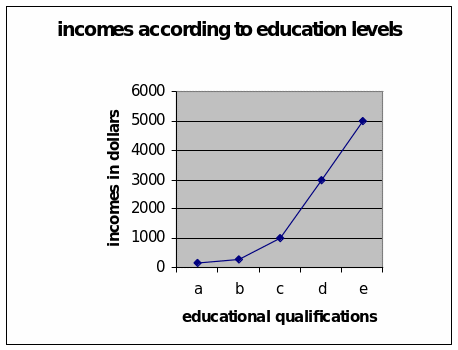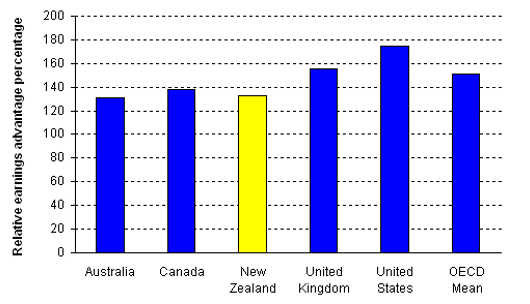Abstract
“The impact of education on all fields of life has been a question of importance since early times. Emerging fields of learning and education open up new vistas for development.” What is the impact of education on income and unemployment?” This is the question the researcher tends to answer from the following research.
Review of the present literature was made by using different sources; they were used to collect the information that has already been discovered about the topic. A random sample of 30 people was taken for assessment of their educational status, their present situation in terms of employment or unemployment, and their income levels.
It is concluded from the information gathered that higher the education (in both magnitude and standard), greater are the chances of one’s getting employment and better income.”
Introduction
“What is the impact of education on income and unemployment?”
It is generally believed that greater number of educational degrees (qualifications) increases for one the chances of getting employment in related fields and a good wage. It is also believed that education determines the fate of a population with respect to its collective income and employment ratio. Situations may differ with different population samples from different locations and societies. We are concerned with American society in our research. In fact the more educated a person is, more productive and capable he becomes, and in fact his chances of getting desired employment increase too, but what are the effects of advancement of education in a particular area of population on a whole? Does every willing person get their desired employment? What is the impact of education on the advancing unemployment in the states? According to the Bureau of Labor Statistics, Education pays in higher earnings and lower unemployment rates. (Education pays, 2008)
According to www.educationcounts.com, the success of an education system is believed to be manifested in, the success of individuals in finding sustainable employment as well as the sum of wages that employers are willing to pay for the skills and knowledge that the individual brings to a job. (Impact of education on income – Education Counts, n.d.)
The topic is diverse, and all these areas in fact, cannot be covered in this small research. We shall, therefore limit ourselves to the impact of education on individual persons’ incomes and their employment criteria.
Reasons for Carrying Out This Research
It is believed that better educational status increases the chance of getting a desired employment and a good income. The direction of education also counts. One cannot work in the field of horticulture after getting a degree in literature. A country’s political, social, and economic conditions also matter a lot and the same is the reason for carrying out this research. Trends are rapidly changing in US. We will study education, income and unemployment in America today.
Methodology
A random sample of thirty individuals will be taken from industrial and educational sector who will be interviewed directly and by questionnaire about their present job entitlement, income, and educational qualification. The questions included in the questionnaire (after name, age, and sex) are:
- Please list your educational qualifications.
- List your vocational qualifications.
- Your present employment/s? Give details.
- Your have been in your present employment for,
- three months
- Six months- a year.
- 1 year – 3 years
- 4 years – six years.
- More, specify.
- Your income range
- $150- $300
- $300-$1000
- $1000-$300
- $3000- $6000
- $6000-more
Results gathered will be analyzed, compared, and presented statistically. And those results will determine the authenticity of our hypothesis.
Research Progress Report
The research was centered at the question, what is the impact of education on income and employment?
For this research, a questionnaire was designed, for 30 individuals who are either employees, or have made attempts to be employed. The questionnaire included questions regarding their ages, their educational qualifications, their jobs, including their ranks at workplaces, and finally their incomes. Some major changes were made to the questionnaire. The following questions were added:
- If you stayed unemployed after receiving a professional qualification, what you are doing as a substitute. Answer choices are; a. started a business, b. continued with higher education, c. continued with some other employment (one with lesser requirements), and d. got frustrated.
- (If), while in job, when you received a new degree (progressed further in education), did you get promoted to a higher degree in you employment?
It is observed that questionnaire served as more effective tool as compared to interview, because busy people feel it easier to fill a short questionnaire rather taking out from their scarce time. Interviewing presented other difficulties too, like some people did not like to answer some of the questions. People sometimes feel uncomfortable in telling about the monthly sum of wages they receive. Out of 28 questionnaires, 23of them sent via mail, and 5 given through personal contacts, 27 were welcomed, 22 filled readily on time, 2 were delayed too much, and 3 were misunderstood and argued upon. All in all 24 questionnaires were received back, filled without disputes. Two persons were interviewed via telephone and the researcher filled the questionnaires based on the interview.
In the questionnaire designed, the question of income was not a direct question requiring one single answer, instead income ranges were provided and one was to be chosen. People feel more comfortable to answer in this manner. Still the authenticity of the answers is not unchallengeable, as it never is.
A second interview was taken from unemployed persons, in order to estimate their seriousness about getting a job. Questions include were:
- Are you happy with the current situation?
- If you are offered a job now, will you accept it? Or go on with your present business or education?
The sampling technique used was one of selecting a random group of individuals from a community of local city on municipal records. Five individuals were taken from a known group of people. Out of this sample, 15 individuals were in industrial jobs, including engineers, scientists and food inspectors etc. Their ranks /designations differ, 4 out of these 15 were in managerial jobs. 3 people were from the educational department, one being the admin manager in a high school, the other two lecturers at colleges.4 individuals belonged to a telecom company. A contract driver and a tailor were also included.
The rest were unemployed. Three of the unemployed individuals turned out to be happy with the substitutes they had chosen for their target jobs. One of them is a 30 year-old graduate in literature, who re joins his education after searching for a job till years (along with a small side business), the other two become business people. Rests of the unemployed people were unhappy, and told they would join a job immediately if they are offered with.
Work extended two days from the proposed time line because of late arrival of some questionnaires.
These data will be presented in statistical form. The relationship of educational marks and income level will be presented by a bar diagram. The relationship of educational qualification and job positions will also be presented by a bar diagram. Relationship of all three will be presented by a multiple frequency polygon. At least two whole days are required for further work.
Research Project
Hypothesis
The question for this research is, “Whether it is true is not that the greater number of educational degrees a person holds, greater are his chances of getting better income and staying employed?” In other words, “Does the standard of education (magnitude, and quality) impact employment ratio of masses and their wages in a positive manner?”
Findings
According to a related research provide at a governmental website of New Zealand, “Average earnings are 32% higher for those with a tertiary education compared to those with only upper secondary and post-secondary non-tertiary education”. (Impact of education on income – Education Counts, 2008
According to a paper issued by The National Center for Public Policy and Higher Education of that “If current trends continue, the proportion of workers with high school diplomas and college degrees will decrease and the per capita personal income of Americans will decline over the next fifteen years.” (The Secretary of Education’s Commission on the Future of Higher Education, n.d.)
It is estimated that a big slice from America’s young generation, which is also the most highly educated generation of the US history— is projected to lead to drop in average level of education over the next twenty years. The only chance to avoid this is case that government takes steps to increase the educational level of all racial/ethnic groups uniformly. (The Secretary of Education’s Commission on the Future of Higher Education, n.d.)
The growing knowledge based economy that requires higher educational levels for most of its workers. At the same time industry is at an increased advantage of hiring workers across the globe.
While other developed countries like China continue to improve the education provide to their people, the US and its workforce will come to a competitive disadvantage.
Also, per capita income levels of the US citizens will be lessened due to the decrease in the average education level of US workers, in turn; also nation’s tax base will be decreased.
The estimated decline in the US’s per capita income and educational level both can, however be reversed, if Americas do a better job of increasing the educational level of all its citizens uniformly; especially the fastest growing segments of population.
The white-raced working population is estimated to decline from 82% to 63% from 1980 to 2020. The minority population is projected to increase from 18% to 37%, that is, double, in the same period, while the Hispanic/Latino portion is projected to almost triple (from 6% to 17%).”
(The Secretary of Education’s Commission on the Future of Higher Education, n.d.)
According to New Zealand’s website, there is a substantial body of evidence showing that people with higher level of education are more active in the labor market, i.e. their participation is higher in number as compared to those with low education levels. Highly educated population is at a lower risk of unemployment, has a greater access to higher education and vocational training, and receives higher wages on an average.
An example of interrelationship of education, income and unemployment is given in the following bar diagram:

- About six million students across the US are at risk of dropping out of schools currently. High school dropouts are unable to contribute to the workforce efficiently enough as they lack the necessary skills required by the demands of nation’s global economy. Jobs require highly skilled personnel and students that acquire the advanced education will find better employments and wages.
- “A college graduate with a bachelor’s degree can earn $650,000 more in a lifetime than they would earn with a high school diploma. The same person would earn $1 million more with a master’s degree and $1.6 million more with a doctorate.” (Alliance for Excellent Education, 2003)
- “Of adults, only 40 percent who dropped out of high school are employed, in today’s workplace; compared to 60 percent of adults who completed high school and 80 percent for those with a bachelor’s degree”. (Alliance for Excellent Education, 2003)
- “The U.S. military does not accept high school dropouts any longer. Only 10 percent of army recruits, 6 percent of navy recruits, and less than 1 percent of air force recruits are accepted with a GED”. (Alliance for Excellent Education, 2003)
“People of a country are its most valuable assets. Employment is explained as the state of being engaged or occupied in a job or service that pays the subject money. Therefore, unemployment could be defined as the state of being out of work. A high rate of unemployment is a clear sign of poor national economic progress, whereas low employment is a sign of good national economic progress. The United States (US) is a highly developed country regarded as a world’s superpower even today. But no matter how powerful and developed the country is, it too suffers from a considerable level of unemployment”. (Reasons for Unemployment Get the Reasons for Unemployment in the US, 2008)
Among other reasons, the article lists these too: Most people in “America don’t get in jobs themselves because the minimum wage of $6.55 per hour is more than what they could earn had they worked at another place. Hence, this too had led to people not getting employed, thus leading to unemployment. Most of the US companies base their operations outside the US as wage rates outside the US (especially in South Asian countries) are lesser.
Automatically, the possibility of potential employment is reduced. Similarly, work which was already taking place in the US is now subcontracted or outsourced to companies in the Asian region, which lead to a huge amount of job loss in the US, which further increased the pool of unemployed. For example, US companies have based their call centers in India and Sri Lanka thus increasing the level of unemployment in the US. (Reasons for Unemployment Get the Reasons for Unemployment in the US, 2008)
Young generation of the US today goes for higher education with a greater preference as compared to that for getting employments. That is also one of the reasons of increased unemployment. (Reasons for Unemployment Get the Reasons for Unemployment in the US, 2008)
Objectives
The objectives of this research were to find out the facts about the mutual relationship of education, employment and income of people, in order to discourage wrong concepts that spontaneously develop in the mind of a population, based on a few individuals’ assumptions.
Results make one to see a clearer view of the relation of these three important factors in the development of society. Especially today rapid political and socioeconomic changes present newer questions day by day. This research may provide a basis for a more directional and purposive research. It is a basic research. According to Best and Kahn, “Such an approach which often leads to knowledge for knowledge’s sake is the approach of basic or fundamental research. It may later result in further research of an applied nature”. (Best and Kahn, 2006)
Sampling Methodology
A random sample of 25 people was taken from the municipal directory. A set of five people was taken from friends and relatives. This way total thirty people were chosen as a sample of population.
Data Gathered
In the questionnaire designed and distributed, following answers were collected:
- Educational qualifications: Seven associate degree holders, ten bachelor degree holders (2 electrical engineers, 1 chemical engineer,1 mechanical engineer,3 Bachelors of biotechnology, 1 Bachelor of English Literature,2 Bachelors of Business Administration),11 masters degree holders (1 Masters of Biotechnology, 4 Masters of Physics, 3 Masters of Mass communication, 2 Masters of Business administration, 1 Masters of Home economics),1 Doctor of Philosophy.
- These people are working as: 1 contract driver, 1 tailor at a tailoring shop, 2 Assistant managers at a gas company, 3 at managerial posts in an electric company, 1 nutritionist,1 horticulture expert, two lecturers, 1 admin manager, 4 at telecom company,4 bankers, and 2 designers.
Summary of the Data
Qualifications
People with less than high diploma: 0
High school graduates: 0
Some college, no degree: 0
Associate degree: 7
Bachelor’s degree: 10
Master’s degree: 11
Professional degree: 1
Income levels (of employed individuals)
$150-$300:2
$300-$1000:8
$1000-$3000:6
$3000-$6000:4
$6000-more: 1
Severn people reported that they had been promoted to their present ranks from the previous ones after receiving a new degree. 3 out of them received educational degrees; while four received vocational degrees while employment. Incomes in US dollars: 200,300,400,500,600,700,800,900,950,1050,2050,2000,2800,4000,4500,5000,5500,5800,5900,6500,8000.
Statistical Representation
Multiple Bar Diagram showing education level and their relationship to income (in dollars), of the collected data:


- a-b: diploma holders.
- b-c: diploma holders to intermediate degree holders (undergraduates)
- c-d: undergraduates- masters degree holders
- d-e: masters- professional degree holders.
Conclusion
From the data collected and its typical analysis, it is proven that higher educational qualification is directly proportional to income, i.e., greater the number of educational degrees, greater are the chances of one to find a desired employment, as well as better wages. The hypothesis is found to be correct. Further studies are required in the area of directional and scattered attitudes of educational degrees and their approaches towards certain, specific employments, and specificity and mastery in professional fields.
References
Alliance for Excellent Education, Impact of Education on: Personal Income & Employment, 2003. Web.
A NATIONAL DIALOGUE: The Secretary of Education’s Commission on the Future of Higher Education. Web.
Best and Kahn, Research in Education, National Book Foundation, Pakistan, 2006. Web.
Impact of education on income – Education Counts, 2008. Web.
Reasons for Unemployment Get the Reasons for Unemployment in the US, 2008. Web.

